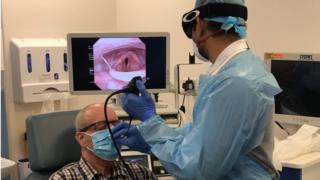
Image copyright
endoscope-i Ltd
The device means patients do not have to remove their face coverings for procedures
A protective device against coronavirus for at-risk doctors is to be provided free to the NHS.
The SNAP device for ear, nose and throat surgeons was created after Burton-upon-Trent consultant Amged El-Hawrani died with Covid-19 in March.
He was one of the UK’s first senior medics to die with the virus, his death showing that they were at serious risk.
The device clips over patients’ masks to prevent the virus spreading through coughs and sneezes.
Image copyright
endoscope-i LTD
Chris Coulson was one of the surgeons who developed the device to protect medics
It was developed by surgeons Ajith George and Chris Coulson, with the help of Aston University, who said nasendoscopy procedures – where a small flexible tube fitted with a camera is inserted into the nose – often made patients cough, splutter and sneeze.
It works by clipping on to either side of a normal surgical face mask, creating a hole for an endoscope to be inserted while keeping the patient’s nose and mouth completely covered.
When it is removed, a one-way valve closes the hole so no virus can escape.
Image copyright
endoscope-i Ltd
Four thousand of the devices will be provided to all NHS hospitals with an ear, nose and throat department for free
Usually half a million nasendoscopies are performed by the NHS each year.
But due to the risks, surgeons are currently only doing 10% of their normal work.
“We were concerned about the safety of doctors but also about the risk of missed diagnoses and opportunities for treatment of patients,” Mr Coulson, an ENT surgeon working at the Queen Elizabeth Hospital in Birmingham, said.
“Our aim has been to produce an easy-to-use, cheap device that would allow clinicians to return to routine practice.”
Four thousand of the devices will be provided to all NHS hospitals with an ear, nose and throat department for free.
A further 26,000 have been manufactured for sale around the world.
“Covid-19 has led to heightened awareness about the spread of disease in clinical environments,” Mr George, based at the Royal Stoke University Hospital, said.
“We see the SNAP device having practical applications during the pandemic and beyond.”
Follow BBC West Midlands on Facebook, Twitter and Instagram. Send your story ideas to: [email protected]

















